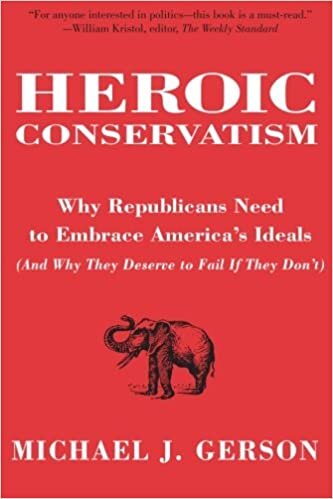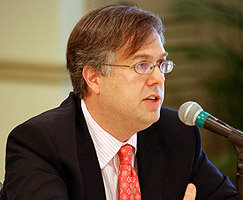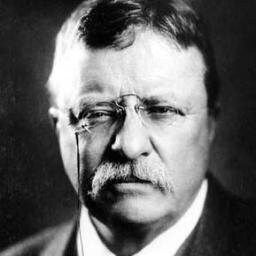The Long View: Heroic Conservatism
This long book review from 2007 is almost enough to make me remember why I liked President George W. Bush at the time. Michael Gerson, chief speechwriter for the 43rd President, had some genuinely good ideas. Unfortunately, giving the nod to subsidiarity in local relief initiatives cannot make up for the immense disaster that was the Iraq War, all the lives and treasure wasted in that futile effort.
One of the reasons I find it valuable to re-post John J. Reilly’s blog is that we all forget too easily. We forget why we supported the politicians we did. We forget what happened, and who did it. At the time, President Bush didn’t get a great deal of credit from his political opponents for trying to act on social justice initiatives from the Right. There was instead a great deal of panic about imminent theocracy.
Former President Bush has now been rehabilitated, but not for a belated appreciation of his efforts, such as No Child Left Behind or the White House Conference on Increasing Minority Homeownership, which have not aged well, but simply because he shares educated Americans’ disdain for the current President.
I think John correctly notes that the Bush era Republicans stumbled in part because they had no way to continue their successes from the 1990s:
The negligence extends even to the Party neglecting its most impressive victories, the author notes. The decrease in crime that occurred during the 1990s, and the related success of welfare-reform at the same time, were the sort of improvements in public order that the author means by “social conservatism.” These successes were achieved in large part by Republicans at the state and local levels. Nonetheless, the business and Libertarian wings of the Party were indifferent to these developments because they did not shrink the size of government. Even worse, from the anti-government point of view: they were examples of capital-intensive government used effectively.
The Newt Gingrich-led House stumbled on some pretty effective ideas, but the Republican Party was unable to follow up on their dominance in part because of an ideological recoil from using the levers of government effectively:
…we must note how disproportionate were the resources and attention that the Bush Administration was willing to devote to the enterprises that were supposed to be inspired by this historical hope. Indeed, it is almost as if the grandeur of the rhetoric is a way of masking how little the Administration actually intended to accomplish. When the president supports faith-based social services, we cannot help but wonder whether part of the reason is that using an improvised force of volunteers is far cheaper than, say, reconstructing local social-service agencies after their corruption during the Great Society era.
Now, we are left to see whether a new generation of post-liberal politicians can drive to the center of American poiltics.


“Solidarity” can mean many things, but as a matter of public policy, it should mean the mitigation of risk. The author’s understanding of Catholic social theory fails to appreciate its emphasis on the need for adequate public structures. Compassion can be an evasion; in fact, it’s usually a mistake to design a social service specifically for the poor. Thus, when the Vice President’s office answered “why should we care?” to a proposed program to help ex-convicts find jobs, the better response may not have been, “What would Jesus do?” but “This is a lot cheaper than hiring the police it would take to shoot the excons before they can steal your car radio or invade your home.” Similarly, education is not primarily a moral issue; certainly it gets us nowhere to consider it in terms of the “rights of parents.” Rather, like inoculation against epidemic disease, it is one of those things than must be done effectively and universally if society is going to work at all. – John J. Reilly
Heroic Conservatism:
Why Republicans Need to Embrace America's Ideals
(And Why They Deserve to Fail If They Don't)
By Michael J. Gerson
HarperOne, 2007
320 Pages, US$26.95
ISBN-10: 006134950X

Michael J. Gerson
By AvianMaid - Own work, CC BY-SA 3.0, https://commons.wikimedia.org/w/index.php?curid=30686629
President George W. Bush has three public voices. One of them, perhaps his natural voice, is informal and succinct; almost staccato. It states the facts as George Bush understands them and states them briefly. Another voice is the uninflected drone of a man with the unhappy duty of reading a teleprompter. The president’s third voice, though, is quite different. It balances long sentences and moves forward through a series of carefully wrought logical climaxes. (It uses words like “wrought.”) This is the voice of George Bush’s major addresses, of which the best examples are his speech to the Republican Convention in 2000, his remarks at the service held in the National Cathedral just after September 11, and most especially, his Second Inaugural Address. This is the voice that George Bush uses when he has plainly thought deeply about what he is saying and has taken the trouble to find the best way he can imagine to say it.
That third voice is often the voice of this book. As you read, you can easily imagine the president saying the text in the compromise pronunciation of General American with his native Texan twang that he reserves for great occasions. The author, Michael J. Gerson, was George Bush’s speechwriter during the presidential campaign of 2000 and through his presidency until a few months before the publication of this book. The author studied theology at Wheaton College, the noted evangelical school in Illinois. He had planned on postgraduate study of the subject, but was diverted into politics, and into speechwriting, by Charles Colson, the convicted Nixon aide who has dedicated his post-prison life to prison ministries and other projects of social reform. This third voice, therefore, may also be the voice of “compassionate conservatism,” which chiefly proposes to use government to increase the nation’s social capital. The president’s “No Child Left Behind” effort to set enforceable national education standards is an example of this kind of policy. So are the “faith-based initiatives,” which try to incorporate local religious institutions into government sponsored social-welfare networks. By extension, compassionate conservatism includes the Bush Administration’s efforts to decrease the sum of human misery around the world, particularly in Africa; the author is never prouder than when he describes his tours of US-funded AIDS treatment centers on that continent, where he saw hundreds of people who would not be alive were it not for President Bush’s policies. At its apex, of course, compassionate conservatism also means the Administration’s stated goal of ridding the world of tyranny. The author did not invent that policy, but he did give it its principal public formulation.
The author continues to support this school of thought (which has other names, of which “National Greatness” may be the most unfortunate). This book was apparently conceived at a time when the president’s fortunes were at low ebb internationally and domestically. After the Republican defeat in the Congressional elections of 2006, and concurrent with the deterioration in Iraq before the Petraeus Surge, the president’s intra-party critics were saying that the fault lay in the president not being a real conservative. Real conservatives, in this view, confine their agenda to lowering taxes and to other pro-business initiatives, while conducting foreign policy within the framework of Henry Kissinger’s tyrant-tolerant Realism. Conservative moral issues include opposition to abortion and to gay marriage; they include nothing else.
To this the author replies that such a philosophy is worse than a crime; it’s a mistake:
What does anti-government conservatism offer to urban neighborhoods where violence is common and families are rare? Nothing. What hope does it provide to children in foreign lands dying of diseases that can be treated or prevented for the cost of American spare change? No hope. What achievement would it contribute to the racial healing and unity of our country? No achievement at all. If Republicans run in future elections with a simplistic anti-government message, ignoring the poor, the addicted, and children at risk, they will lose, and they will deserve to lose.
Heroic Conservatism is essentially a memoir of the Bush Administration as seen by the principal speechwriter. Among its other virtues, the book explains what an in-house speechwriter does. Modern presidents are often criticized for simply reciting the words written for them by their handlers and aides. Actually, as we learn here, the president is usually required to make substantial remarks three times a day at various ceremonial occasions, a task that would tax the abilities of even the most facile and polymathic executive. The speechwriting shop in the White House seems to be in large part a research service. In order to prepare for important addresses, the author of this book sat in on the briefings the president received, and often also on the meetings of the policy principles. Occasionally, especially on domestic issues, he was asked for his opinion. The president edited and re-edited the drafts of the major speeches, often face-to-face with the author.
Regarding George Bush’s inner circle, the author notes that it is difficult to enter; admittance depends on a personal assessment by Bush himself that is rapidly made and difficult to alter. Toward those admitted, however, the president becomes privately solicitous and publicly protective. The president does not seem to be a particularly bad judge of character or of administrative ability, so his system had real merits of stability and loyalty. The problem, the author notes, is that sometimes the people the president appointed never had a clue about what they were doing, yet they continued to receive his support; that was what happened with the leadership of the Federal Emergency Management Agency at the time of Katrina. (It was also, frankly, what happened in connection with the people assigned to carry out the president’s policy of faith-based initiatives, though the author does not dwell on the matter.) Donald Rumsfeld as Secretary of Defense was a more tragic case. He was well qualified to carry out the president’s original policy of turning the military into a small, globally mobile, highly capable reaction force. He was simply not the right man to plan for a counterinsurgency campaign or to fight a war of attrition. The president was not unaware of this, but took a very long time before replacing him.
The author has two major observations about the president’s motivations. Echoing other assessments of George Bush, the author noted this from their first period of collaboration in preparation for the campaign of 2000: “For Governor Bush, self-discipline served as a substitute for ambition.” An observer more critical than the author might suggest that it is possible to be over-briefed. The author does note the sincerity and depth of the president’s Christianity. It reformed his life, by all accounts for the better. It also formed his social conscience; we may safely surmise that the need to express that impulse was what moved him to hire a theology student as his speechwriter. And here is what that speechwriter says about the content of theologically informed social theory at the Bush White House:
Surprisingly, the key to understanding the domestic policy of this evangelical president can be found in the teachings of the Church of Rome...This tradition begins with a principle called “subsidiarity,” the belief that human needs are best served by the institutions closest to human beings: strong families, religious congregations, charitable groups, local unions, civil associations...Government has a duty to respect these institutions...because their health is essential to the justice of society...Subsidiarity is fully consistent with the philosophy of the American founding...[t]here is, however, one more element in Roman Catholic social teaching that takes a large step beyond traditional conservatism: ...”solidarity.” In this belief, the justice of any society is measured by the treatment and status of the weak and oppressed.
The author is an evangelical, too, one who identifies with the Social Gospel tradition that runs through William Jennings Bryan and the New Deal, and which the author argues petered out only with the death of Hubert Humphrey. We are treated to a rehabilitation of Bryan who, as the author points out, promoted the gamut of what now seem essential government functions that extends from women’s suffrage to unemployment insurance. Bryan’s opposition to evolution was really opposition to Social Darwinism, we are told; the textbook he condemned at the famous Scopes trial, entitled A Civic Biology, was in part a tendentious eugenicist tract. (Bryan was not a Young Earth Creationist, by the way, but the rehabilitation does not include a full description of Bryan’s position.)

It is the author’s view, and apparently to some extent the president’s, that “conservatism” should include some such understanding of the public good as that which motivated early 20th-century Republicans like Theodore Roosevelt. This view is alien to many in the Republican Party today. For much of the Republican leadership, in Congress and in the Office of the Vice President, the only moral issues are issues of personal morality, and the chief political role of those issues is to “baptize” tax cuts. Indeed, readers will soon gather that the author is not the most partisan of political professionals:
[Democratic Governor Bob Casey of Pennsylvania] called the absolutist pro-choice position [of his own party] a manifestation of the “cult of the Imperial Self.” And he thought that Republican libertarianism – the elevation of personal and economic freedom over other values like compassion and community – was a different application of the same Social Darwinist impulse. “This,” he said, “is how the Cult of the Imperial Self manifests itself in Republican circles.” I could have easily worked for such a man, but serious health problems prevented his candidacy.
Still, whatever the author’s sincerity, we cannot help but note that his defense of the Bush record on domestic issues is sometimes an exercise in pleading in the alternative. On one hand, the author points to a list of new programs in areas ranging from AIDS to education to prescription drugs for the elderly. On the other hand, he parses the budget numbers to show that federal expenditures have risen very slightly if you exclude the increases related to national defense and homeland security. Surely it is difficult to argue that the president can care very much about projects on which his government spends so little?
The author suggests that some elements of the Republican Party are so focused on their low tax, small government agenda that they don’t really care what the new spending is for. The mere fact that gross federal spending has increased during Bush’s tenure shows that he is not really a conservative:
Why don’t antigovernment conservatives mention spending increases when they make their critique? Because a minimalist state cannot fight a global war – so it is easier for critics to ignore the global war. But after the next attack comes, no one will complain that we didn’t cut government enough.
Similarly, on domestic issues, the author detects a certain indifference among elements of the party leadership to the systemic consequences of their proposals:
The president and I saw Katrina as an opportunity to open a debate on race and poverty. Anti-government Republicans saw Katrina as an opportunity to cut off medicine to old people [by reducing Medicare expenditures to pay for disaster relief]. It confirmed the worst image of Republicans as the party of shriveled hearts.
Once or twice, the author acknowledges a change in the reputation of the Party that is probably more important: a dozen years of anti-government Republican hegemony has persuaded the electorate that the party, at least at the federal level, is not so much hard-hearted as incompetent. The Republican Party used to be the home of austere balanced-budget fanatics and of the evil genius Richard Nixon. Now it is the party of negligent chaos, the party that believed that neither deficits nor the burning of Baghdad was important. (The author is oblivious to the fact that immigration has been added to this list; most people find if deeply creepy when the president suggests illegal immigration is no great matter because, as a child, his Mexican servants were so kind to him.)
The negligence extends even to the Party neglecting its most impressive victories, the author notes. The decrease in crime that occurred during the 1990s, and the related success of welfare-reform at the same time, were the sort of improvements in public order that the author means by “social conservatism.” These successes were achieved in large part by Republicans at the state and local levels. Nonetheless, the business and Libertarian wings of the Party were indifferent to these developments because they did not shrink the size of government. Even worse, from the anti-government point of view: they were examples of capital-intensive government used effectively.
This brings us to foreign policy. In that area, the author had considerable rhetorical influence on the president, for the excellent reason that George Bush entered office without great foreign-policy ambitions. He ran on a platform of avoiding the social-work wars that the Clinton Administration conducted in the Balkans, and most especially of avoiding the nation-building project that Clinton attempted in Haiti. When history presented him with a less tranquil world than he had anticipated, he needed something to say.

What the author found for the president to say was what the author believed the Declaration of Independence and Lincoln’s Second Inaugural and Woodrow Wilson’s 14 Points said, and indeed what Jimmy Carter and Ronald Reagan said: the promotion of freedom is an imperative of good societies. In Bush’s Second Inaugural, this principle became the basis of foreign policy:
“The survival of liberty in our land increasingly depends on the success of liberty in other lands. The best hope for peace in our world is the expansion of freedom in all the world.“
Immanuel Kant might have said that in a frisky moment. It is a statement of the unobjectionable proposition that the safest multi-state world is a world of liberal republics. The author’s innovation was to turn this statement of philosophical orientation into the Bush Doctrine:
“So it is the policy of the United States to seek and support the growth of democratic movements and institutions in every nation and culture, with the ultimate goal of ending tyranny in our world.”
This policy was immediately denounced from many quarters as subversive, revolutionary, impractical, and just plain no good. Still, the author does have a point when he says that the Bush Doctrine is more continuous than Henry Kissinger’s brand of Realism with American tradition. And the Bush Doctrine is not quite the crypto-Trotskyite project to immanize the Hegelian eschaton that its critics claim. Rather, it has more to do with historical hope, in the sense that Benedict XVI described it in Spe Salvi just a few weeks after this book appeared. The author of this book puts it thus:
[The] future is uncertain, but not random, at least to people of faith...evil will never be finally eradicated this side of eternity. But history still has a direction, set by a God Who calls His flawed servants to a small part in a Great Story. And no act of compassion, no work of justice, no matter how hidden or hopeless, is ever useless or wasted.
Fine words, surely, but we must note how disproportionate were the resources and attention that the Bush Administration was willing to devote to the enterprises that were supposed to be inspired by this historical hope. Indeed, it is almost as if the grandeur of the rhetoric is a way of masking how little the Administration actually intended to accomplish. When the president supports faith-based social services, we cannot help but wonder whether part of the reason is that using an improvised force of volunteers is far cheaper than, say, reconstructing local social-service agencies after their corruption during the Great Society era. We have already noted the fate of Donald Rumsfeld, who tried to fight a regionally transformative war with a high-tech expeditionary force. Whatever the purity of its motives, the Bush Administration shares, and in high degree, the Libertarian Right’s indifference to the well-being of institutions; of the “res publica,” of the “common wealth.” On matters ranging from the National Guard on perpetual deployment, to the proposal to divert Social Security tax payments to private accounts, or for that matter the refusal to recognize that no institution, not even the federal government of the United States, can run huge deficits indefinitely, the Bush Administration has shown itself ready to mine the institutions and traditions which have been entrusted to its care, in a way different in degree rather than kind from the way the Russian oligarchs appropriated the existing Soviet economy after the dissolution of the USSR.
“Solidarity” can mean many things, but as a matter of public policy, it should mean the mitigation of risk. The author’s understanding of Catholic social theory fails to appreciate its emphasis on the need for adequate public structures. Compassion can be an evasion; in fact, it’s usually a mistake to design a social service specifically for the poor. Thus, when the Vice President’s office answered “why should we care?” to a proposed program to help ex-convicts find jobs, the better response may not have been, “What would Jesus do?” but “This is a lot cheaper than hiring the police it would take to shoot the excons before they can steal your car radio or invade your home.” Similarly, education is not primarily a moral issue; certainly it gets us nowhere to consider it in terms of the “rights of parents.” Rather, like inoculation against epidemic disease, it is one of those things than must be done effectively and universally if society is going to work at all. For that matter, the abortion and gay marriage controversies can be recast as questions of what social institutions will keep the birth rate at or above the replacement level. The evidence of the last 40 years is that Darwin favors tediously traditional families.
Churchill used to say that you can count on the Americans to do the right thing, after they have tried all the other options. At this writing, that seems to be what has happened in Iraq. The Bush Administration’s bluff was called. Finally, and visibly against its will, the Administration undertook the difficult task of nation-building that really could do what the Bush Administration said it intended to do, both for Iraq and its region. It is not too much of a stretch to suggest that nation-building will soon be on the agenda for the United States, too. And how might this be done? The author has had some thoughts along these lines:
It would be good for American democracy if both parties were to appeal to religious voters...Most evangelicals are not libertarians. Many are troubled by materialism and the social philosophy of “winner-take-all.” Majorities of both liberal and conservative Christians favor increased humanitarian foreign aid, universal health care, and greater aid to poor Americans. An agenda that is “pro-life and pro-poor” would have a powerful appeal for many evangelicals. But no appeal will be effective if the deepest beliefs of religious people are viewed as suspect, and their strongest principles are declared a threat to democracy.
If this is not “conservative,” then maybe conservatism should go hang.
Copyright © 2007 by John J. Reilly
Support the Long View re-posting project by downloading Brave browser, and then trying it out. With Both Hands is a verified Brave publisher, you can leave me a tip too!



Comments ()